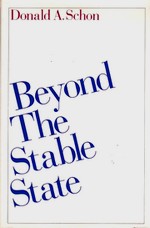“Please don’t read this post!”
It seems as if there is some reader repellent that takes effect when I write about books on management and organizational behavior such as Geoffrey Vickers’ Making Institutions Work, so I might as well warn you off at the start. Fans of neglected books are rarely interested in such a dry topic and readers of management books usually couldn’t be bothered to consider anything written more than five years ago, unless it was written by Peter Drucker. So the intersection of the two is a tiny set of which I might just be the only member.
If not, cough or something. It would be nice to have some company.
But management is the stuff of my working day and I sometimes find that work and hobby cross paths.  Donald Schon’s Beyond the Stable State
Donald Schon’s Beyond the Stable State represents one such intersection. I discovered it after reading Theory in Practice: Increasing Professional Effectiveness
, which is devoted to a topic I spend a lot of time thinking about on my job: how to foster a community of practice within an organization.
I love the way Schon opens this book:
I have believe for as long as I can remember in an afterlife within my own life–a calm, stable state to be reached after a time of troubles. When I was a child, that afterlife was Being Grown Up. As I have grown older, its content has become more nebulous, but the image of it stubbornly persists.
In every organization and in every job I’ve ever held, this belief seems to be the bedrock of how people approach whatever change is going on or looming on the horizon: “Things are crazy right now, but eventually things will settle down and get back to normal.”
They never do, of course. And they certainly never revert back to something we were used to. Tomorrow’s change is not quite the same as yesterday’s, and it’s safe to assume that neither will next week’s or next years. Yet still we cling to this sense that things will settle down, calm down, stabilize. And we do the same thing when it comes to our own lives. At the moment, my stable state is life after the kids have all left home and finished college–but how stable (unchanging) will it actually turn out to be?
Schon takes it as a given that things will never settle down. The appropriate response to any change, in his view, is to understand it, not to fight it or even to surrender to it: “The task which the loss of the stable state makes imperative, for the person, for our institutions, for our society as a whole, is to learn about learning”–to become capable, in other words, of making continual transformation a given rather than reacting to it as an anomaly.
Beyond the Stable State is not quite neglected–it’s in print and easily available online, if not in stores. Nor is it that easy to read–the passage above is contrasted by more than a few stretches of fuzzy prose: “The loss of the stable state carries with it continuing mismatch between specific elements and their situations, and thereby precipitates movement up the ladder of functional aggregation.” Ten bucks to the first reader who can translate that.
But Schon’s core message is so simple and yet profound: change is here, it’s pervasive, and it’s accelerating, so learn to handle it. Constant reorienting is a crucial skill, as is that of not being too afraid to make mistakes one can learn from. In a more condensed and perhaps more accessible format, this could well be an essential text that should be passed out and taught to high schoolers already forming the illusion that things will settle down once they finish college and get a job. Until someone writes that book, though, it’s necessary to roll up the sleeves and dig into Beyond the Stable State.

Well, like they always say, change is inevitable. I believe the “stability” we’re talking about here is a bit redefined in a sense. Change will always be constant.
Thanks, Thomas. Nice to know I have some company.
I’m familiar with Martin Mayer’s work and mentioned Wall Street on my post about Books to Watch “Mad Men†By, Part 2. I read both The Bankers and The New Bankers about a dozen years ago when I worked on the NSTAC Financial Services Risk Assessment. Both books were enormously useful–primers, really, on how the banking system works and the forces that drive its development.
Cough.
I appreciate your throwing these in the mix. Personally, I’m a fan of nonfiction (including good business books), so these breaks among the (otherwise quite interesting) novels, etc. are welcome. I have nothing to say about Schon’s book, except that I can recognize “change” as a huge theme of recent business literature, and I suppose (on the model of other areas) that this “dated” book probably does it much better than any number of more recent iterations. I can promise you that I will check it out at the local university library.
My main reason for commenting, however, is to plug another neglected nonfiction, workaday, book that I almost mentioned on the Vickers post, but didn’t quite get up to. That is, Martin Mayer’s The Lawyers. Or anything by Martin Mayer. Basically, he’s a ca. 1960s journalist, highly literate, who studied various segments of society (e.g., The Schools, Wall Street) and wrote them up at book length. Having read The Lawyers and then entered law school, it amazes me how relevant much of what he said in the late 1960s remains accurate about the profession today. In any event, I think it’s an illuminating volume, and no one has been able to point me to a more recent or better replacement. And it is most certainly out of print and neglected.
Again, thanks for your work here – fiction or nonfiction, one of the best sites on the web.